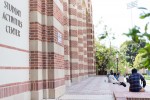“It’s not my responsibility to teach you, it’s your responsibility to learn.”
That’s the motto boasted by many in the LGBTQ groups on campus.
The problem is: Who are students expected to learn from?
This is an important question many students are asking at UCLA. The Gender, Sexuality, and Society Living Learning Community on the Hill provides a space for LGBTQ students to dorm together based on a shared interest and community. And outside of the dorms, student-led LGBTQ initiatives on campus focus on creating safe spaces for marginalized communities.
These spaces are meant to help LGBTQ members advocate for their needs and engage in community building. They don’t, however, leave much room for students still learning the ins and outs of LGBTQ activism.
Within the LLC, for example, there is pushback against students who misuse pronouns or terminology in an offensive manner, despite the possibility these students do not understand the context behind their wording. That disconnect creates a hostile environment between those who finally want to be a part of a space where their identities are validated and those looking to be better assets for positive social change within their community.
“You kind of have quite a bit of catching up to do in terms of educating yourself on certain things, like knowledge about LGBTQIA+ culture, among other things,” said Elizabeth Friedman, a first-year art history student who lives in the LLC. “When you make mistakes, you kind of have this ‘problematic’ label that kind of follows you around.”
In other words, there’s a call-out culture that’s prevalent in many of these groups.
This culture may be created from members of the LGBTQ community becoming increasingly frustrated at being expected to educate others on how to respect their identities or why microaggressions are offensive, especially in safe spaces designed for them to not have to. But while students with more extensive backgrounds on social justice feel exhausted from a constant demand to educate, those with less social justice background can feel barred from these communities and feel attacked for what they don’t know.
As a result, these spaces built on inclusivity become inherently exclusive.
Nieves Winslow, a second-year art student and the founder of Queer and Trans People of Color, a group created to provide a safe space for students from these marginalized communities, said there are a lot of difficulties in cultivating a space when working with marginalized intersections of identity.
“It can be frustrating to feel as though you have to educate people as a person with marginalized identities,” Winslow said. “It’s often those with the most marginalized identities that become responsible for this.”
Moreover, reconciling these spaces is not an easy task. Promoting community and inclusion as a student on a campus as large as UCLA is a big job with many barriers.
Alejandro Pulido, a co-founder of Queer Peer Counseling at UCLA, an LGBTQ student mentorship program, said it is hard to find mentors who are knowledgeable enough about LGBTQ issues and intersections of race and background within the LGBTQ community to best help these students.
Yet it is important to create these spaces for students who have been constantly forced to defend their own identities, said Maria Hammett, a fourth-year environmental science student and executive director of Queer Alliance, the student-run mother organization in charge of overseeing certain LGBTQ student groups on campus.
“Having an organization dedicated to serving queer students is important – especially for the identities not commonly served and recognized by the campus, such as queer and trans people of color,” Hammett said.
But people from these marginalized groups can struggle in these spaces due to differing levels of background knowledge on social justice. Frustration at constantly being expected to educate is understandable, but it feeds into a culture of making these spaces inaccessible and can create a hostile environment in which members of the LGBTQ community feel excluded from their own spaces. The policing of these spaces means they lose much of the inclusion they preach.
Ian Segler, a third-year sociology student and a resident of the LLC, said while he enjoys living in the community, the call-out culture hurts the sense of community the floor is meant to create.
“I like living in the LLC because, as a queer person, I feel physically safe being on this floor. But the call-out culture is really toxic,” Selger said. “It’s a form of public shaming, and it brands people as a sort of social pariah.”
The LLC was created to be a space for living and learning built upon inclusion and community for LGBTQ students. Yet it – and others like it – have frequently become more divisive than inclusive.
“There’s no room for growth, and open conversations are quickly shut down,” Selger said.
Many might argue there are a plethora of resources on the internet or outside of these groups through which people can educate themselves before attempting to be a part of these communities.
But the problem with this self-education mindset is these groups and resources are an attempt to bolster inclusivity on campus. Creating an inclusive environment means allowing those interested in the social movements the ability to learn and to be a part of a cause they care about.
The irony is the groups created to promote that inclusion at UCLA might have just become exclusionary in the process.
